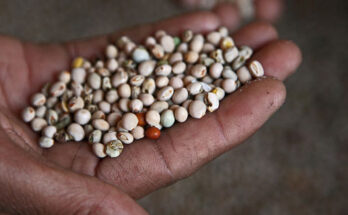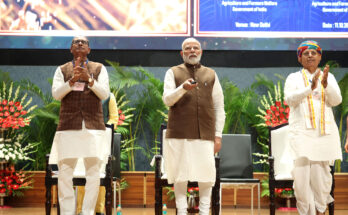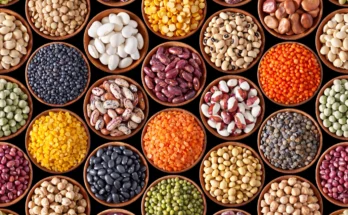A new wave of agricultural transformation is on the horizon, as the Government of India prepares to roll out over 1,100 agriculture sector projects worth ₹42,000 crore on October 11, 2025. The massive initiative, to be launched by Prime Minister Narendra Modi, will span agriculture infrastructure, animal husbandry, fisheries, and food processing — signalling a decisive leap toward farmer prosperity and rural development.
The announcement was made by Union Minister of Agriculture and Farmers’ Welfare and Rural Development, Shivraj Singh Chouhan, at a press conference in New Delhi. Highlighting the upcoming Rabi sowing season, he said the Prime Minister’s launch of two historic initiatives — the ‘PM Dhan-Dhaanya Krishi Yojana’ and the Self-Reliance in Pulses Mission — would mark a turning point in India’s journey toward self-sufficiency and sustainable agricultural growth.
“Under the visionary leadership of Prime Minister Modi, India’s agriculture is achieving remarkable milestones and is poised to become the world’s food basket. The nation’s progress will now be measured not against previous governments but against global standards,” said Chouhan.
At the heart of the Prime Minister’s new agricultural mission lies a three-pronged goal — food security, income enhancement, and nutritional sustainability. Since 2014, India’s food grain output has surged by nearly 40%, setting new records in wheat, rice, maize, groundnut, and soybean production. The country is now self-sufficient in wheat and rice and has exported over 4 crore tonnes of agricultural produce, showcasing its growing global footprint.
Yet, pulses remain a challenge. India, though the world’s largest producer and consumer of pulses, continues to import significant quantities. Addressing this, Chouhan unveiled the Self-Reliance in Pulses Mission, a comprehensive plan to expand cultivation from 27.5 to 31 million hectares by 2030–31, raise production from 24.2 to 35 million tonnes, and increase productivity from 880 kg to 1,130 kg per hectare.
To achieve these targets, the government has outlined a robust research and development roadmap, focusing on high-yielding, pest-resistant, and climate-resilient pulse varieties. Distribution of quality seeds through 1.26 crore quintals of certified seeds and 88 lakh free seed kits will ensure widespread access. Additionally, 1,000 new processing units will be established in pulse-growing regions, each supported with a ₹25 lakh subsidy, to promote local value addition and boost farmers’ earnings.
One of the most ambitious components of this transformation is the PM Dhan-Dhaanya Krishi Yojana, aimed at bridging productivity gaps across India’s 100 low-performing agricultural districts. Drawing inspiration from the successful Aspirational Districts Programme, this initiative will integrate irrigation expansion, crop diversification, credit access, and modern storage infrastructure to uplift rural livelihoods.
The scheme will be monitored through a real-time dashboard managed by NITI Aayog, ensuring accountability and data-driven implementation. “If the productivity of these low-performing districts is raised even to the national average, national output will rise substantially, farmers’ incomes will grow, and India’s food needs will be secured,” Shri Chouhan emphasized.
The projects to be launched on October 11 will anchor India’s transition to a modern, technology-driven agricultural ecosystem aimed at empowering farmers and strengthening rural economies. Over 50 lakh farmers have been linked through 10,000 Farmer Producer Organisations (FPOs), including 1,100 ‘Crorepati FPOs’ with an annual turnover exceeding ₹1 crore, demonstrating the growing financial strength of farmer collectives.
A major institutional reform is underway with the computerisation of 10,000 new Primary Agricultural Credit Societies (PACS) into e-PACS, which will function as Common Service Centres (CSCs), Pradhan Mantri Kisan Samriddhi Kendras (PMKSKs), and fertiliser retail outlets, thereby integrating technology and service delivery at the grassroots level. To further diversify rural income sources, multi-purpose PACS are being established for dairy and fisheries cooperatives in 10,000 locations, enhancing livelihood opportunities beyond crop farming. Complementing these efforts, 4,275 rural Multi-purpose AI Technicians (MAITRIs) have been certified across the country, ushering in scientific animal husbandry practices and improving productivity in livestock management.
These measures collectively aim to enhance market access, digitize rural finance, and promote natural farming — strengthening India’s agricultural backbone.
Chouhan noted that these landmark initiatives will be launched on October 11, coinciding with the birth anniversary of Loknayak Jayaprakash Narayan, a symbol of rural empowerment and people’s governance.
As India steps into what could be its most transformative phase in agricultural history, the government’s ₹42,000 crore investment and 1,100 project roll-out represent not just economic reforms but a social revolution — empowering farmers, ensuring food security, and cementing India’s status as a global agricultural powerhouse.




